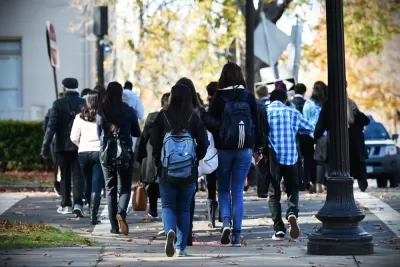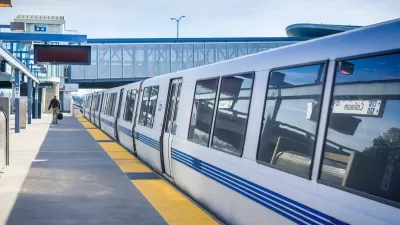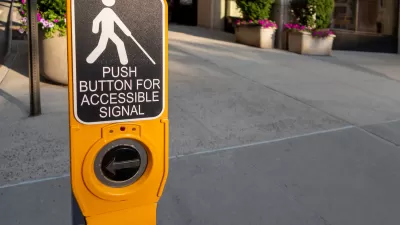An initiative to promote pedestrian-oriented infrastructure investments in Washington state highlights the lessons that policymakers can learn from people who rely on walking and public transit.

With transportation emissions accounting for almost half of Washington state's greenhouse gas emissions, making a meaningful impact calls for a reduction in reliance on personal vehicles. What better source for learning about a car-free lifestyle, asks Anna Zivarts, than those who already don't drive? A quarter of Washingtonians don't have driver's licenses, and many more don't own cars due to high maintenance costs, health issues, or personal choice. Yet policymakers consistently fail to design public infrastructure that effectively serves pedestrians and transit-dependent people.
"To get where we need to go in a system not designed for us, those of us who can’t drive have become experts in weaving together bus schedules across counties, in planning our grocery trips and doctor’s appointments days in advance so we can request rides. We have figured out how to patch together accessible ways to get to the local community center, and to cross highways that not only block fish passage, they keep us from visiting our neighbors. And if you ask us, we can tell you exactly what kinds of investments are needed to make it possible for more people to be less dependent on driving."
To bring these issues to light, the Disability Mobility Initiative is creating a storymap that features "interviews with people from across our state who rely on transit, paratransit, walking, rolling or community rides." The initiative aims to highlight how a lack of accessible infrastructure makes more people reliant on cars and suggest investments that can lead to a more equitable, inclusive, and sustainable transportation system.
FULL STORY: As we aim for less reliance on cars, learn from those who don’t drive

Planetizen Federal Action Tracker
A weekly monitor of how Trump’s orders and actions are impacting planners and planning in America.

Maui's Vacation Rental Debate Turns Ugly
Verbal attacks, misinformation campaigns and fistfights plague a high-stakes debate to convert thousands of vacation rentals into long-term housing.

Cuomo Is the Candidate of Both NIMBYs and Developers. What Gives?
In the New York City mayoral race, odd bedfellows align to preserve the housing status quo.

Amtrak Rolls Out New Orleans to Alabama “Mardi Gras” Train
The new service will operate morning and evening departures between Mobile and New Orleans.

The Subversive Car-Free Guide to Trump's Great American Road Trip
Car-free ways to access Chicagoland’s best tourist attractions.

San Antonio and Austin are Fusing Into one Massive Megaregion
The region spanning the two central Texas cities is growing fast, posing challenges for local infrastructure and water supplies.
Urban Design for Planners 1: Software Tools
This six-course series explores essential urban design concepts using open source software and equips planners with the tools they need to participate fully in the urban design process.
Planning for Universal Design
Learn the tools for implementing Universal Design in planning regulations.
Heyer Gruel & Associates PA
JM Goldson LLC
Custer County Colorado
City of Camden Redevelopment Agency
City of Astoria
Transportation Research & Education Center (TREC) at Portland State University
Jefferson Parish Government
Camden Redevelopment Agency
City of Claremont





























